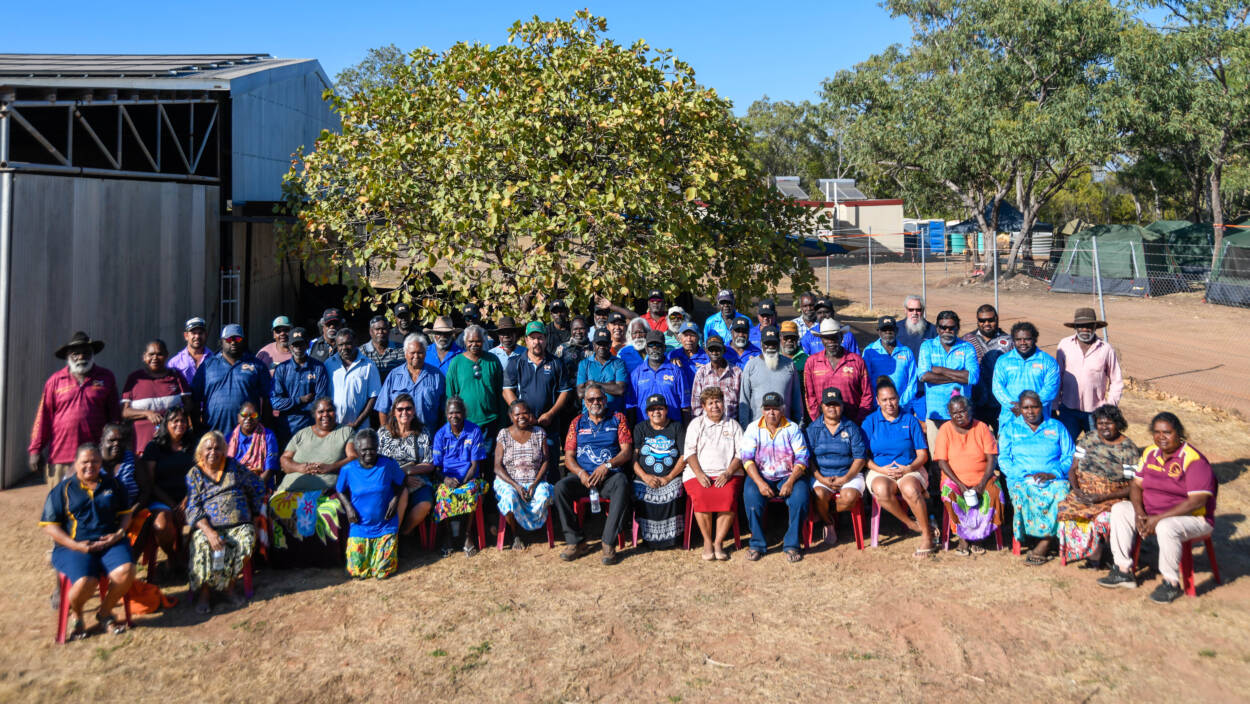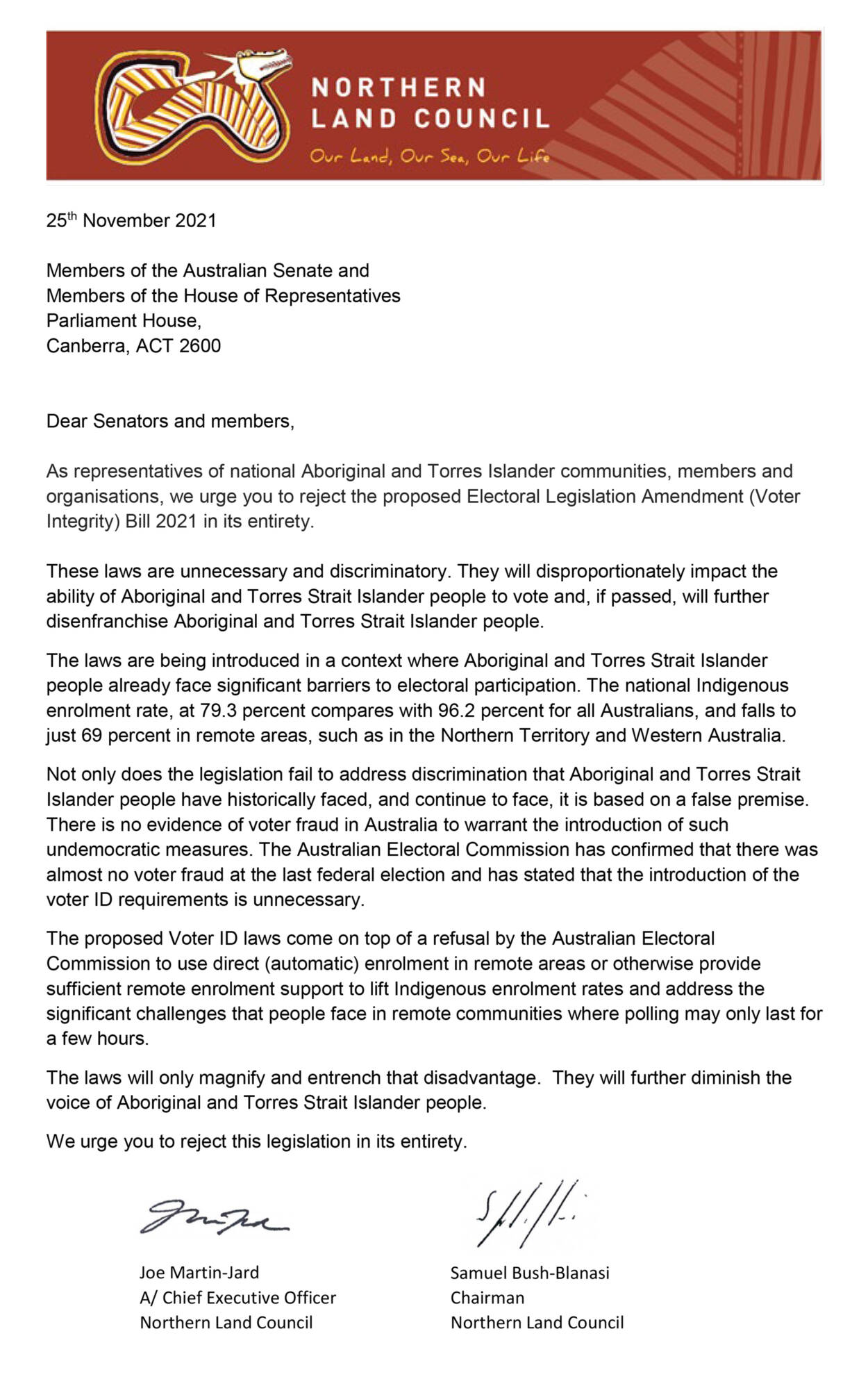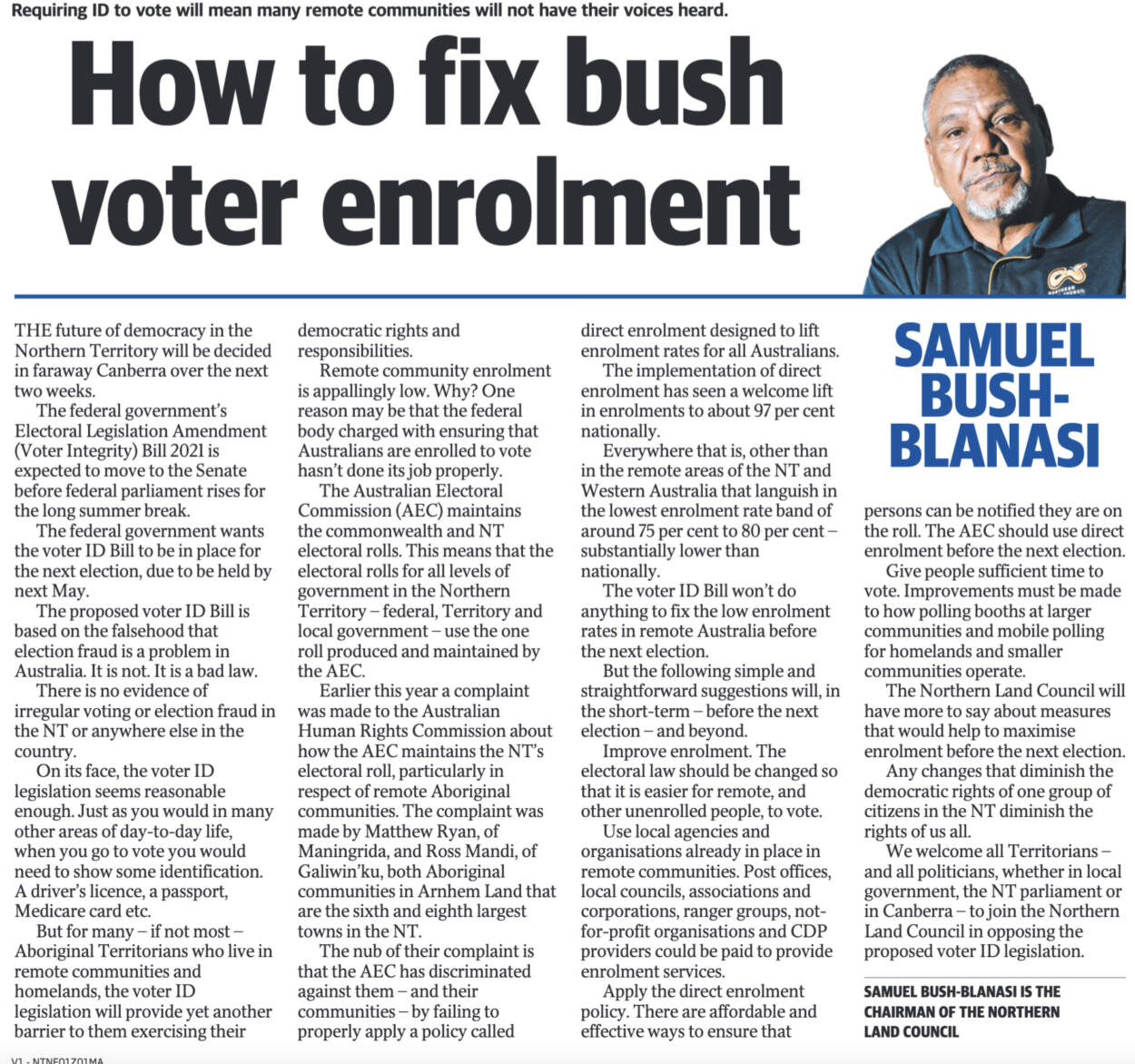Support our call to stop racist voter ID laws
Date: Nov 24, 2021
Publication Type: Blog
As representatives of national Aboriginal and Torres Islander communities, members and organisations, we urge you to reject the proposed Electoral Legislation Amendment (Voter Integrity) Bill 2021 in its entirety.
Tell these Senators to say NO to the laws making it harder to vote
There are 3 Senators whose vote is most likely to control whether the Morrison Government can make these new laws that will make it harder for First Nations people to vote.
Their names and contacts are below.
Please email or call them, or both, asking them to reject these new, racist voter ID laws.
Stirling Griff
Email: senator.griff@aph.gov.au
Canberra phone: (02) 6277 3128
Adelaide phone: (08) 8272 7575
Twitter: @Stirling_G
Jacqui Lambie
Email: senator.lambie@aph.gov.au
Canberra phone: (02) 6277 3614
IG: @lambienetwork
Twitter: @jacquilambie
Rex Patrick
Email: senator.patrick@aph.gov.au
Canberra phone: (02) 6277 3785
Twitter: @Senator_Patrick
Read more about these new, racist, voter identification laws below.
An open letter to Parliament on the proposed voter ID Bill
25th November 2021
Members of the Australian Senate and
Members of the House of Representatives
Parliament House,
Canberra, ACT 2600
Dear Senators and members,
As representatives of national Aboriginal and Torres Islander communities, members and organisations, we urge you to reject the proposed Electoral Legislation Amendment (Voter Integrity) Bill 2021 in its entirety.
These laws are unnecessary and discriminatory. They will disproportionately impact the ability of Aboriginal and Torres Strait Islander people to vote and, if passed, will further disenfranchise Aboriginal and Torres Strait Islander people.
The laws are being introduced in a context where Aboriginal and Torres Strait Islander people already face significant barriers to electoral participation. The national Indigenous enrolment rate, at 79.3 percent compares with 96.2 percent for all Australians, and falls to just 69 percent in remote areas, such as in the Northern Territory and Western Australia.
Not only does the legislation fail to address discrimination that Aboriginal and Torres Strait Islander people have historically faced, and continue to face, it is based on a false premise. There is no evidence of voter fraud in Australia to warrant the introduction of such undemocratic measures. The Australian Electoral Commission has confirmed that there was almost no voter fraud at the last federal election and has stated that the introduction of the voter ID requirements is unnecessary.
The proposed Voter ID laws come on top of a refusal by the Australian Electoral Commission to use direct (automatic) enrolment in remote areas or otherwise provide sufficient remote enrolment support to lift Indigenous enrolment rates and address the significant challenges that people face in remote communities where polling may only last for a few hours.
The laws will only magnify and entrench that disadvantage. They will further diminish the voice of Aboriginal and Torres Strait Islander people.
We urge you to reject this legislation in its entirety.
Joe Martin-Jard
A/ Chief Executive Officer
Northern Land Council
Samuel Bush-Blanasi
Chairman
Northern Land Council
An open letter to Parliament on the proposed voter ID Bill
OPINION: How to fix voter enrolment in the bush
The proposed Voter ID Bill being considered in Canberra is based on the falsehood that election fraud is a problem in Australia — it is a bad law, writes NLC chair Samuel Bush-Blanasi
Originally published in the Sunday Territorian 21 November 2021
THE future of democracy in the Northern Territory will be decided in faraway Canberra over the next two weeks.
The federal government’s Electoral Legislation Amendment (Voter Integrity) Bill 2021 is expected to move to the Senate before federal parliament rises for the long summer break.
The federal government wants the Voter ID Bill to be in place for the next election, due to be held by May next year.
The proposed Voter ID Bill is based on the falsehood that election fraud is a problem in Australia. It is not. It is a bad law.
There is no evidence of irregular voting or election fraud in the NT or anywhere else in the country.
On its face, the Voter ID legislation seems reasonable enough. Just as you would in many other areas of day-to-day life, when you go to vote you would need to show some identification. A driver’s licence, a passport, Medicare card etc.
But for many — if not most — Aboriginal Territorians that live in remote communities and homelands, the Voter ID legislation will provide yet another barrier to them exercising their democratic rights and responsibilities.
NLC Samuel Bush-Blanasi has condemned federal government moves to introduce voter ID laws. Picture Katrina Bridgeford.
Remote community enrolment is appallingly low. Why? One reason may be that the federal body charged with ensuring that Australians are enrolled to vote hasn’t done its job properly.
The Australian Electoral Commission (the AEC) maintains both the Commonwealth and NT electoral rolls. This means that the electoral rolls for all levels of government in the Northern Territory — Federal, Territory and local government — use the one roll produced and maintained by the AEC.
Earlier this year a complaint was made to the Australian Human Rights Commission about how the AEC maintains the NT’s electoral roll, particularly in respect of remote Aboriginal communities. The complaint was made by Matthew Ryan of Maningrida and Ross Mandi of Galiwin’ku, both Aboriginal communities in Arnhem Land that are respectively the sixth and eighth largest towns in the NT.
The nub of their complaint is that the AEC has discriminated against them — and their communities — by failing to properly apply a policy called direct enrolment designed to lift enrolment rates for all Australians.
Voter ID laws are being considered by the federal government.
The implementation of direct enrolment has seen a welcome lift in enrolments to around 97 per cent nationally.
Everywhere that is, other than in the remote areas of the NT and Western Australia that languish in the lowest enrolment rate band of around 75 per cent to 80 per cent – substantially lower than nationally.
The Voter ID Bill won’t do anything to fix the low enrolment rates in remote Australia before the next election.
But the following simple and straightforward suggestions will, both in the short-term — before the next election — and beyond.
Improve enrolment. The electoral law should be changed so that it is easier for remote, and other unenrolled people, to vote.
Use local agencies and organisations already in place in remote communities. Post offices, local councils, associations and corporations, ranger groups, not-for-profit organisations and CDP providers could be paid to provide enrolment services.
Apply the direct enrolment policy. There are affordable and effective ways to ensure that persons can be notified they are on the roll. The AEC should use direct enrolment before the next election.
Give people sufficient time to vote. Improvements must be made to how polling booths at larger communities and mobile polling for homelands and smaller communities operate.
The Northern Land Council will have more to say about measures that would help to maximise enrolment before the next election.
Any changes that diminish the democratic rights of one group of citizens in the NT diminish the rights of us all.
We welcome all Territorians — and all politicians, whether in local government, the NT parliament or in Canberra — to join the Northern Land Council in opposing the proposed Voter ID legislation.
Samuel Bush-Blanasi is the chairman of the Northern Land Council
Sunday Territorian - Samuel Bush-Blanasi - 21 November 2021
Negotiations over government's proposed voter ID laws | SBS News
Top journalists agree there is no point in the voter ID law | Sydney Morning Herald
Listen to podcast here: https://www.smh.com.au/please-explain/fate-of-controversial-voter-id-laws-hangs-in-balance-20211125-p59c1d.html




